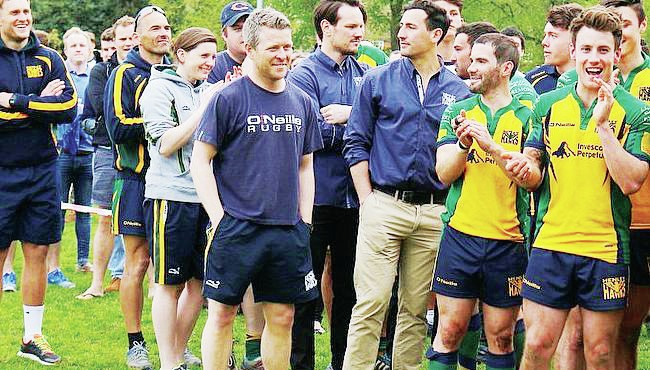I put everything into coaching, emotion is key

Steve Hill puts the questions to Pete Davies head coach of Oxford Harlequins who have just been promoted to Level 4
Why did you get into coaching rugby and how did you arrive at your current position?
I transitioned from playing to coaching the season I retired at Henley. Having graduated from Cardiff Met I was always destined to go into coaching. After eight years as head coach at Henley I moved to Oxford Harlequins and I took up the post as head coach in 2019.
What is your profession outside of coaching rugby?
I'm an assistant Headteacher at a large state school in Oxford called The Cherwell School. I've been at the school since 1998 apart from a one year sabbatical I took to travel and play rugby in Australia for Sydney University.
How would you describe your style of coaching?
Clear and passionate. I know how I want my teams to play which is effective but exciting, and fulfilling when it works. I put everything into my coaching as emotion is often the difference between winning and losing.
What do you find the most challenging aspects of coaching?
Accommodating large numbers of players – often over 50 at training – and giving them the amount of attention I'd like to. We only have them for three hours a week, so making the most of that time is crucial.
Has anyone been an advisor/mentor/inspiration on your coaching journey?
Many good coaches including: Dai Rees, Nigel Dudding, Mike Poulson and Jim McKay and Ben Ryan at Newbury. Currently I speak to Billy Millard (DoR at Harlequins), and Paul Turner (head coach at Ampthill)
So far what would you count as your most significant coaching achievement and why?
I've been lucky enough to be involved in four promotions as head coach (two at Henley and two at Oxford Quins), but I think this year's promotion was probably my biggest achievement-particularly as we did it whilst remaining completely amateur.
How do you foster a positive team/club culture?
Culture is vital at our level. We have a mantra which is one club, three teams. We do everything together, from training to the socials.
You have just achieved promotion to Level 4, the highest the club has ever been. What, if any, changes did you make to the way the team was coached or prepared for matches during this season?
We targeted giving away 15 points or less away per game. Jon Vermont (defence and forwards coach) did a tremendous job with our defence. We had the best defensive record in the league.
Oxford Harlequins has established a close relationship with Oxford Brookes University. How has this helped the club?
The Brookes/Quins partnership has provided a pathway for players to transition between university and adult league rugby. We have had five or six Brookes alumni playing in the 1st team, and many current students playing in the 2nd and 3rd team squads. The partnership has also help us significantly increase the size of our medical team. But the most significant benefit the partnership has provided is through our medical team.
What changes to your coaching content, approach or preparation may need to be made with your team playing in a higher league next season?
The physicality will be more significant in National 2, so firstly the players need to get bigger and stronger over the summer. We will need to be even more effective at set-piece, especially at maul time in defence and attack BUT we will not change our desire to attack.
Who have you really enjoyed coaching/developing and why?
I've been lucky to have coached some terrific players such as Jack Willis, Curtis Langdon, Tom Parton, Piers O'Conor, Tom West, Alec Hepburn and Will Rowlands. But the player at Oxford Quins who stands out is Toby Haines. Gifted player, great attitude and role model.
What more could the RFU do to assist clubs who are not full time professional?
Rugby is the only major sport where the governing body makes promotion a financial burden. I think salary caps at National 2 and below should be lowered, or even abolished. If there was a level playing field then clubs would have to invest in the game in order to attract and retain players. The current RFU model encourages clubs to rely on key sponsors and high net worth individuals in order to compete, thus creating the cycle of boom and bust that we have seen over and over again.
As a coach what two laws or aspects of the game would you change to make it a better experience for either yourself or your players?
Ban box kicking from the base of a scrum, ruck or maul anywhere outside the 22m area – this would lead to more running rugby. Also stop being apologetic for the game that it is…which is a full contact, brutal, high intensity collision based invasion game.
What two words would your current or previous players use to describe you as a coach and why?
Passionate and intense. Even though I'm coaching at an amateur level, I still treat every game like it's a grand final. I set high standards for myself and my players, but they also know I care deeply about them as individuals and as a group.
What advice would you give to anyone considering or just starting to get involved in coaching rugby?
Do it, it's incredibly fulfilling. Whether that be coaching an age group in the minis and juniors, the academy or a team in the adult section (men's or women's), if you have an interest and passion for the game and are able to share that with others, you won't regret it.